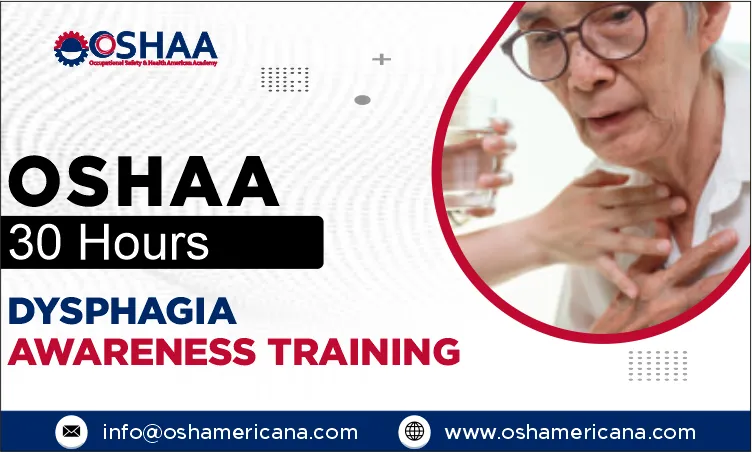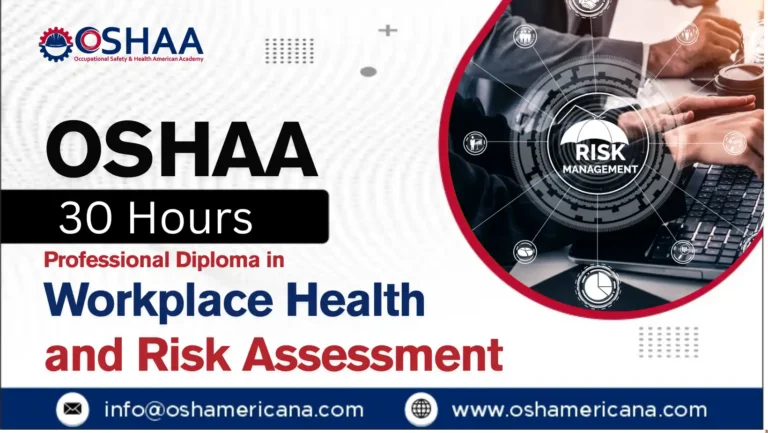Provide Compassionate Swallowing Support: Dysphagia Training
The OSHAA 30-Hours Dysphagia Awareness Training is a comprehensive program designed to equip healthcare professionals with the essential knowledge and skills needed to identify, assess, and manage swallowing difficulties effectively. Dysphagia, or difficulty swallowing, is a common yet often overlooked condition that impacts millions of individuals worldwide, particularly elderly patients, those recovering from surgery, and individuals living with neurological disorders. Left unmanaged, dysphagia can lead to severe complications including malnutrition, dehydration, aspiration pneumonia, and even life-threatening emergencies. This course plays a critical role in helping healthcare providers mitigate these risks while improving the quality of care and patient outcomes.
The OSHAA 30-Hours Dysphagia Awareness Training highlights the importance of early recognition of dysphagia symptoms and the adoption of safe, evidence-based interventions. By gaining a deeper understanding of the causes, risks, and consequences of dysphagia, participants will be able to design and implement personalized care strategies that promote patient safety, reduce the risk of aspiration, and enhance overall nutritional wellbeing. This training emphasizes the strong connection between professional competence, regulatory compliance, and patient safety, making it a valuable qualification for anyone working in healthcare environments where dysphagia management is a priority.
This specialized training not only improves practical knowledge but also supports compliance with healthcare regulations and international standards of care. By completing the OSHAA 30-Hours Dysphagia Awareness Training, participants demonstrate their commitment to maintaining the highest levels of professional care, safety, and accountability. The curriculum integrates theoretical learning with practical applications, ensuring that learners are well-prepared to apply their knowledge in real-world clinical settings. The training reinforces the importance of multidisciplinary teamwork, effective communication, and a patient-centered approach, which are essential for minimizing risks and enhancing recovery outcomes.
The OSHAA 30-Hours Dysphagia Awareness Training stands as a vital program for modern healthcare systems, ensuring that patients receive the highest standard of care while professionals maintain full compliance with global safety standards. By enrolling in this course, learners gain advanced knowledge, develop practical clinical skills, and reinforce their role as leaders in patient safety and healthcare quality.
OSHAA 30-Hours Dysphagia Awareness Training
To enroll in the OSHAA 30-Hours Dysphagia Awareness Training, candidates must meet the following minimum entry criteria:
- Age: 16 years or older.
- Education: Basic literacy and numeracy skills are required. No prior dysphagia knowledge is necessary, making this course accessible to those new to caregiving as well as experienced professionals seeking specialized awareness training. Related prior learning may include a Level 2 Certificate in Health and Social Care, Level 2 Award in Food Safety, NVQ in Care, or relevant workplace training in supporting individuals with eating and drinking difficulties.
- Language: Competency in English (written and spoken) sufficient to understand medical terminology related to dysphagia, care protocols, and complete assessments. Non-native speakers should have an IELTS 5.5 or equivalent.
- Experience: No prior healthcare experience is required. This course is suitable for care home staff, healthcare assistants, support workers, nurses, catering staff in care settings, family caregivers, and anyone supporting individuals with swallowing difficulties
Study Units
Learning Outcomes
The OSHAA 30-Hours Dysphagia Awareness Training has been carefully designed to equip healthcare professionals with the advanced skills, compliance knowledge, and patient safety leadership abilities required to manage swallowing disorders effectively.
Introduction to Dysphagia (2 Hours)
- Gain a clear understanding of what dysphagia is and why it is a critical concern in healthcare settings
- Recognize the prevalence of dysphagia in different patient populations, including the elderly, neurological patients, and post-surgical cases
- Develop awareness of the potential risks and complications associated with untreated swallowing disorders
- Appreciate the importance of early intervention and compliance with international healthcare standards
Types and Causes of Dysphagia (4 Hours)
- Identify the different types of dysphagia, including oropharyngeal and esophageal
- Understand the neurological, muscular, and structural causes contributing to swallowing difficulties
- Learn how to link underlying medical conditions such as stroke, Parkinson’s disease, or head and neck cancer to dysphagia risk
- Strengthen the ability to explain causes to patients and families, improving patient communication and awareness
- Apply OSHA and clinical safety guidelines in assessing causes and planning interventions
Symptoms and Diagnosis of Dysphagia (4 Hours)
- Recognize the early signs and symptoms of dysphagia to reduce risks of malnutrition, aspiration, and pneumonia
- Develop skills in patient screening and diagnostic assessment tools used by healthcare professionals
- Understand the role of imaging techniques such as videofluoroscopy and endoscopy in accurate diagnosis
- Improve the ability to document symptoms and diagnosis in line with healthcare compliance and reporting standards
- Apply evidence-based practices to identify high-risk patients in both clinical and community settings
Clinical Management of Dysphagia (5 Hours)
- Master techniques for safe feeding, positioning, and dietary modifications for patients with swallowing disorders
- Apply clinical protocols that minimize risks of aspiration and promote safe swallowing
- Gain practical skills in working with interdisciplinary teams to provide holistic patient care
- Learn how to create individualized management plans that enhance patient well-being and reduce hospital readmissions
- Align clinical practices with OSHA standards and international best practices for patient safety
Complications of Dysphagia (4 Hours)
- Understand the short-term and long-term complications, including aspiration pneumonia, dehydration, and malnutrition
- Recognize the economic and healthcare system burdens associated with untreated dysphagia
- Develop proactive strategies to prevent complications through patient monitoring and continuous care
- Strengthen competencies in emergency response when complications arise in clinical or care home settings
- Ensure compliance with safety standards and regulatory reporting requirements
Patient and Family Education on Dysphagia (5 Hours)
- Acquire communication skills to educate patients and families about dysphagia management
- Learn how to provide clear instructions on safe feeding, positioning, and home care practices
- Empower families to recognize early warning signs and seek timely medical support
- Enhance patient-centered care by involving caregivers in decision-making processes
- Promote a culture of awareness that aligns with OSHA training and global healthcare education standards
Speech and Language Therapy in Dysphagia Care (3 Hours)
- Understand the critical role of speech and language therapists in dysphagia rehabilitation
- Gain knowledge of therapeutic exercises and techniques to strengthen swallowing muscles
- Learn collaborative approaches to integrate therapy into patient care plans
- Recognize when to refer patients to speech and language specialists for advanced intervention
- Enhance multi-disciplinary teamwork for effective dysphagia care delivery
Legal and Ethical Considerations in Dysphagia Care (3 Hours)
- Understand the legal responsibilities of healthcare professionals in managing dysphagia
- Recognize ethical dilemmas, including patient autonomy, consent, and quality-of-life issues
- Ensure compliance with healthcare laws, OSHA guidelines, and international patient safety standards
- Learn to balance professional duties with ethical decision-making in sensitive patient care situations
- Strengthen accountability and uphold professional integrity in dysphagia management
The OSHAA 30-Hours Dysphagia Awareness Training prepares learners to apply advanced clinical knowledge, improve patient safety outcomes, and uphold the highest levels of compliance in healthcare environments.
The OSHAA 30-Hours Dysphagia Awareness Training delivers a wide range of benefits for healthcare professionals, organizations, and stakeholders committed to improving patient safety and care standards. This specialized training program equips learners with essential knowledge and advanced skills required to recognize, assess, and manage dysphagia effectively while maintaining full compliance with OSHA guidelines and international healthcare standards.
- Comprehensive Knowledge of Dysphagia
- Learners gain an in-depth understanding of the causes, types, and symptoms of dysphagia.
- The course ensures that healthcare professionals can identify swallowing difficulties early and reduce risks.
- This knowledge directly improves patient safety and prevents severe complications.
- Enhanced Clinical Skills
- Participants develop practical skills in managing patients with dysphagia.
- Training covers safe feeding techniques, dietary modifications, and therapeutic interventions.
- Professionals gain confidence in delivering patient-centered care.
- Regulatory Compliance and OSHA Standards
- The course ensures learners understand and apply OSHA guidelines in clinical practice.
- Compliance reduces organizational risks of liability and legal consequences.
- Institutions benefit from adherence to global safety and healthcare standards.
- Improved Workplace Safety and Risk Reduction
- Participants learn proactive strategies to prevent aspiration, malnutrition, and other complications.
- Enhanced knowledge leads to fewer incidents and reduced patient emergencies.
- Healthcare facilities benefit from stronger risk management practices.
- Professional Development and Career Advancement
- Completing the OSHAA 30-Hours Dysphagia Awareness Training demonstrates commitment to professional growth.
- The qualification enhances career opportunities across hospitals, care homes, and rehabilitation centers.
- Learners position themselves as skilled, competent, and compliance-ready professionals.
- Organizational Cost Savings
- Early identification and effective management of dysphagia reduce hospital readmissions.
- Prevention of complications minimizes costly treatments and emergency interventions.
- Healthcare organizations benefit from greater operational efficiency and financial savings.
- Leadership in Patient Safety
- Participants develop the ability to lead safety initiatives in dysphagia management.
- The course empowers learners to influence safety policies and best practices.
- Professionals become role models for compliance and quality care delivery.
- Enhanced Communication and Patient Education Skills
- Learners gain strong communication techniques to guide patients and families.
- Education on safe feeding and care practices strengthens patient engagement.
- Professionals improve trust and collaboration with caregivers.
- Emergency Preparedness in Dysphagia Complications
- Training equips participants with skills to respond effectively to emergencies.
- Professionals learn to handle aspiration pneumonia, dehydration, and choking incidents.
- Quick response reduces risks of fatal outcomes and enhances patient survival.
- Ethical and Legal Awareness
- The course instills knowledge of ethical responsibilities in dysphagia care.
- Learners understand consent, patient autonomy, and professional accountability.
- Compliance with legal frameworks strengthens credibility and professional practice.
- Interdisciplinary Teamwork and Collaboration
- Participants learn to work effectively with speech therapists, nurses, and physicians.
- Interdisciplinary collaboration improves care coordination and outcomes.
- The course builds teamwork skills essential for healthcare success.
- Worker Well-being and Job Satisfaction
- Professionals experience reduced stress by applying clear protocols and safe practices.
- Confidence in managing dysphagia leads to greater workplace satisfaction.
- A safer environment enhances staff morale and overall well-being.
- Global Recognition of Skills
- The OSHAA 30-Hours Dysphagia Awareness Training is aligned with international standards.
- Learners can apply their knowledge across diverse healthcare systems.
- The qualification enhances mobility and recognition in global healthcare careers.
- Continuous Improvement and Innovation
- The training promotes evidence-based practices and innovative care methods.
- Learners stay updated with the latest research and treatment protocols.
- Healthcare providers gain a culture of continuous improvement and excellence.
- Strengthened Organizational Reputation
- Facilities that train staff in dysphagia awareness demonstrate high standards of care.
- Improved patient outcomes enhance institutional credibility and trust.
- Regulatory compliance and safety leadership reinforce a positive public image.
By enrolling in the OSHAA 30-Hours Dysphagia Awareness Training, learners and organizations gain a comprehensive set of benefits that extend far beyond the classroom. This professional qualification not only strengthens clinical skills and ensures OSHA compliance but also elevates patient care, reduces organizational risks, and promotes long-term career success.
The OSHAA 30-Hours Dysphagia Awareness Training is designed for healthcare professionals, care providers, and organizational leaders who are responsible for ensuring patient safety, compliance with OSHA standards, and the delivery of high-quality care. This course is highly relevant to industry professionals, organizations, and stakeholders across hospitals, rehabilitation centers, nursing homes, and community care facilities.
- Doctors and Physicians
- Play a key role in diagnosing and managing patients with dysphagia in hospital and clinical settings.
- The OSHAA 30-Hours Dysphagia Awareness Training enhances their ability to recognize symptoms early and prevent life-threatening complications.
- Strengthens diagnostic accuracy, clinical decision-making, and patient management strategies.
- Ensures compliance with OSHA healthcare standards while improving patient safety outcomes.
- Nurses and Clinical Care Staff
- Nurses are often the first to identify dysphagia symptoms during patient assessments.
- The course equips them with advanced skills to support feeding protocols and monitor risks.
- Builds competence in emergency preparedness for aspiration and related complications.
- Strengthens workplace safety and compliance with international healthcare guidelines.
- Speech and Language Therapists
- Play a vital role in rehabilitation and therapy for patients with swallowing disorders.
- The OSHAA 30-Hours Dysphagia Awareness Training provides structured knowledge to refine therapeutic interventions.
- Enhances collaboration with doctors, nurses, and caregivers in multidisciplinary care.
- Supports compliance with global standards of patient-centered therapy.
- Dietitians and Nutrition Specialists
- Responsible for designing safe dietary plans for patients with swallowing difficulties.
- This course enhances their ability to assess risks and recommend appropriate nutrition strategies.
- Improves patient well-being by ensuring safe food and fluid modifications.
- Reinforces compliance with OSHA safety standards related to patient nutrition management.
- Caregivers and Support Workers
- Caregivers often assist patients with daily feeding and support.
- The OSHAA 30-Hours Dysphagia Awareness Training provides them with essential safety knowledge.
- Teaches proper feeding techniques to prevent aspiration and malnutrition.
- Strengthens their role in compliance with organizational safety protocols.
- Healthcare Administrators and Managers
- Responsible for organizational compliance, safety standards, and staff training.
- This training enhances their ability to implement dysphagia management policies.
- Reduces institutional risks related to patient safety and liability.
- Ensures that facilities meet OSHA and international healthcare compliance requirements.
- Rehabilitation and Palliative Care Specialists
- Work with patients who require ongoing support for swallowing difficulties.
- The OSHAA 30-Hours Dysphagia Awareness Training ensures best practices in long-term care.
- Enhances skills for safe feeding and holistic patient well-being.
- Supports compliance with legal, ethical, and patient-centered care standards.
- Emergency and Critical Care Staff
- Handle high-pressure situations involving aspiration, airway obstruction, or severe dysphagia cases.
- This training equips them with rapid-response techniques to save lives.
- Builds competence in managing post-surgical patients with swallowing difficulties.
- Reinforces OSHA-aligned emergency preparedness and safety standards.
- Healthcare Educators and Trainers
- Train future professionals on patient care and safety management.
- The OSHAA 30-Hours Dysphagia Awareness Training strengthens their curriculum with globally recognized standards.
- Ensures consistency in teaching evidence-based practices.
- Supports compliance with OSHA and international healthcare training requirements.
- Policy Makers and Healthcare Regulators
- Develop and enforce healthcare safety policies at institutional and national levels.
- This training enhances their understanding of dysphagia-related risks and patient care needs.
- Supports data-driven policy making and healthcare regulation.
- Reinforces compliance with OSHA guidelines and international healthcare standards.
The OSHAA 30-Hours Dysphagia Awareness Training is a globally relevant program designed to meet the needs of diverse professionals across healthcare systems. By completing this course, participants gain advanced knowledge, practical skills, and internationally recognized certification.







